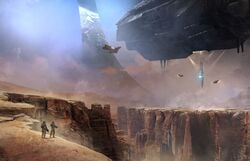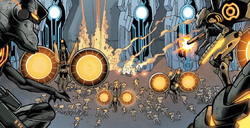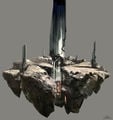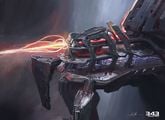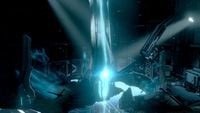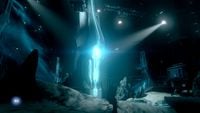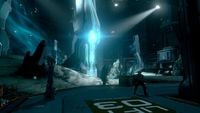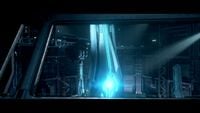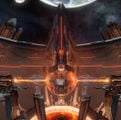Composer
From Halopedia, the Halo wiki
- "The Composer! So many possibilities and capabilities tied up in that strange name... A Composer of minds and souls!"
- — Forthencho, Lord of Admirals[1]
The Composer[note 1][2] is a machine created by the Forerunners to translate an organic being's mental content into machine data.[3] Categorized as a sublimation device,[2] the Composer was meant to provide seamless transitions between biological and digital states. The machine was later appropriated to counteract the Flood,[4] although it failed to save the parasite's victims and was quickly abandoned in this capacity. Despite this, the Composer was later used for a number of purposes beyond its original function.[5]
Function
Overview
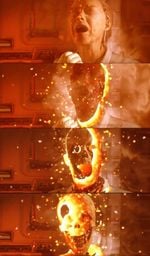
The Composers were originally designed as a means by which to extract the mental pattern (commonly known as an essence) of a biological being of sufficient neural complexity and converting it into data by broadcasting high-energy fields of entangled sympathies. The process, which was not fully understood by even its Forerunner creators, utilized neural physics, a phenomenon once mastered by the Precursors — one of select few Forerunner technologies to do so. According to the original design, the Composer would allow old Forerunners to transfer their essences into younger bodies or directly into the Domain's vast realms of information.[4][note 2] The technology was worked on in obscurity for centuries. In the latter days of the human-Forerunner wars, after the Forerunners' first contacts with the Flood, Master Builder Faber took note of the Composers and planned to use the devices to cure the parasite's victims.[4] The plan was to save those afflicted by the Flood by scanning their patterns and removing any traces of the Flood from the digital essence, which would then be imprinted on a new, artificially constructed biological body devoid of Flood infection. However, the process was highly flawed. In addition to being extremely painful to the individuals undergoing the process, all attempts to restore the essences to biological form failed as the artificial bodies would quickly decay and inevitably die.[5] For this reason the Forerunners quickly abandoned the Composers after the first experiments.[6][note 3]
The physical effects of the Composer on its targets are also violent: the device projected a beam of orange light which completely reduces the targeted individuals to ash in a rather gruesome and painful manner. This is seemingly a byproduct of the machine's original design as a means to combat the Flood, allowing the complete destruction of infected biomass in a manner similar to certain Forerunner weapons designed to completely atomize their targets. The beam possesses the capability to process hundreds of thousands of targets in mere moments across enormous distances,[7] such as composing targets on a planet's surface from an orbiting ship,[8] or those on the surface of an entire Halo installation in an instant.[7] Forthencho, Lord of Admirals, the supreme commander of all human forces and one of the humans to have their minds harvested, described the effects of the Composer as "strange, ever-changing" and "multiformed", as it was operated in that instance via intermediary Lifeworker machinery.[9]
As witnessed on Installation 07, Flood victims subjected to Composer processing were able to retain their individuality,[10] but the Flood would continue to rot and deform their physical bodies, the infection having survived the destruction of the original biological body and then resumed in the new one. The Forerunners attempted to slow down this process by wrapping the afflicted individuals' bodies in a form of supportive harness flowing with energy,[11] but the victims would still continue to deform beyond recognition and eventually expire or succumb to the Flood. Similarly, when the Gravemind used corrupted, Composer-processed essences imprinted on living human bodies as messengers to the Librarian in her final moments on Earth, the humans' bodies would rapidly decay and soon die.[12]
Essence preservation
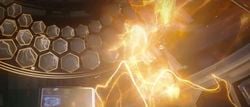
Minds scanned by the Composer could be processed in a variety of ways. The ancient human personalities extracted and stored by the Librarian at Charum Hakkor retained their essences in virtually unchanged form, preserving the victims' identities and even the records of their physical bodies, although the latter could not be reconstituted to biological form.[13] These stored personalities could also be implanted into the genetic code of living beings, with said personalities achieving self-awareness and retaining their original identity within their new hosts; an example of this are the ancestral memory imprints of Chakas and Riser. The Composer could also be used to remove these imprinted personalities, although this did grave physical and mental damage to the individual carrying the imprint.[14]
In the case of the Ur-Didact's Promethean Knights, the extracted neural map was used as the basis for artificial intelligence constructs in a manner similar to the creation of human smart AIs. These intelligences contain many of their original memories and sometimes even portions of their personality, but otherwise behave within the limits of the duties assigned to them.[15] These essences were stored in imprint matrices known as Durances, similar to the devices traditionally used to contain the last mental impressions of a deceased Forerunner.[16]
Immunization
The Composer does not work on all organic beings; certain individuals can, through genetic manipulation, become immune to its effects. After undergoing an experimental mutation in an attempt to gain immunity to the Flood, the Ur-Didact's physiology became incompatible with the Composer,[17] but even with his incompatible physiology, the Ur-Didact was composed by the firing of multiple Composers at the same time.[18][19] Similarly, the geas the Librarian placed on humanity allowed Spartan John-117 to develop a resistance to the Composer; this ability had to be activated and thus it does not automatically protect all humans from the device.[20]
History
Creation and use at Charum Hakkor
First developed by the Builders working in conjunction with Lifeworkers several centuries before the end of the human-Forerunner wars,[4] the Composers were constructed at a facility known as the Composer's Forge. In the centuries following the conflict this installation would come to be overseen by a monitor known as 859 Static Carillon, who was regarded as the keeper of the Composers.[21] While the many faults of the Composers were quickly recognized, the Forerunners would later find other uses for the devices.
After the fifty-three-year siege of Charum Hakkor, the strongly Builder-influenced Old Council intended to exact their vengeance on their human enemies and make sure the humans' fate would be as cruel as possible. Thus, even though the Forerunners already possessed other technologies capable of extracting an individual's memories and personality impressions,[22][23] the Council provided only Composers to the Librarian and her Lifeworkers when they were ordered to process the last human survivors.[5] The essences of the archived humans would be preserved in future generations of humans, with the intent that they would share their knowledge with the devolved remnants of humanity and aid them in rebuilding their civilization. The Master Builder and other like-minded Forerunners intended to study the stored memories in hopes of discovering how humanity managed to defeat the Flood, subjecting machine-stored copies of the essences to tortuous interrogation over thousands of years.[24]
Abandonment and later use
As a result of the risks and irregularities involved with their usage, the Forerunners eventually abandoned the Composers and their existence was made a closely guarded secret known to only a few.[6] Even the machines' actual nature remained obscure; whether the Composer was a machine or being remained uncertain to most. Some even believed the Composer to be a "product of its own services"; a Forerunner, perhaps a Lifeworker, suspended in the final stages of Flood infection.[25][26]
Around 97,445 BCE the Lifeworkers no longer employed the long-abandoned Composers when scanning sentient beings for indexing in the Conservation Measure, instead using a far gentler form of pattern extraction technology.[23]
A Composer was acquired and used by Master Builder Faber in an attempt to stave off Flood infection in certain Forerunners on Installation 07. While in control of Installation 07, Mendicant Bias and the Primordial also used the Composer to extract the ancestral memory imprints from Chakas and the other humans from Erde-Tyrene.[14]
Later during the war the Didact used the Composer to convert the Promethean warriors loyal to him into robotic forms to allow them to combat the Flood more efficiently and without risk of infection. To bolster his numbers the Didact used the Composer on a number of humans transplanted to Omega Halo, turning them into additional forces in his mechanized army. This led to his imprisonment on Requiem by the Librarian.[17]
Rediscovery
Installation 03
One Composer was stored on Halo Installation 03. In late 2554[27] the UNSC Office of Naval Intelligence discovered the machine, which they designated SBJ 8490-03,[28] in a location known as the Composer's Abyss; after the flagship UNSC Infinity extracted the device in 2557 it was transported to Ivanoff Station, a research facility in the asteroid field in Installation 03's orbit. The machine was partially buried within the installation's surface and remained embedded in a large chunk of rock when the ship transported it to Ivanoff. Some of the scientists were digitized by the Composer while studying it and the sensor data from the incident contained coordinates that led Infinity to Requiem.[29]
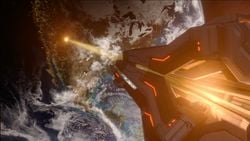
Upon awakening on Requiem in July 2557, the Didact headed for the Composer at his first opportunity and acquired the device after launching an attack on Ivanoff Station. Planning to use the Composer to neutralize all of mankind by forever imprisoning them in digital form, he first used it on the research and security personnel of Ivanoff; Spartan John-117 was the only survivor as a result of genetic modifications imbued by the Librarian. The Didact then set course for Earth in order to realize the final stage of his plan. He successfully fired the Composer on a URNA metropolis, New Phoenix, but the effect was halted when John-117 destroyed the Composer, and the Didact's ship along with it, with a HAVOK tactical nuclear weapon.[8] Some of the resulting digital intelligences survived, having been transported into the Composer's Abyss on Installation 03[30] and later to Requiem via a slipspace transit portal connected to the Composer.[15]
The Composer's Forge
- Main article: Skirmish on Installation 03
Following the New Phoenix Incident the Didact was plunged to Installation 03 through the Composer's slipspace portal. After killing a team of human scientists and their Spartan escorts, the Didact wished to seek revenge on Earth. Soon he encountered monitor 859 Static Carillon at the Composer's Abyss. Recognizing the monitor as the keeper of the Composers, the Didact had Static Carillon show him the entrance to the Composer's Forge, where the Composers were constructed and maintained. Shortly after, Blue Team discovered the slipspace portal that led to the Forge. Upon entering the Spartans were shocked to discover six more Composers located inside the Forge. The Spartans were confronted by the Didact and a large firefight ensued, with numerous Promethean constructs backing up the Didact.[note 3] Static Carillon had Gamma Halo appear over the Composer's Forge per his agreement with the Didact, who then took one of the six Composers and departed the Forge for the Halo. The monitor revealed to the Spartans that the Didact intended to use the Composer and the Halo to destroy humanity, starting with Earth. With Static Carillon's help Blue Team escaped the Composer's Forge and returned to Installation 03 through the Composer's Abyss.[21]
Upon exiting the Abyss Blue Team witnessed the Didact positioning the Composer over the Halo. Intending to remove Blue Team as a threat the Didact attacked the Spartans.[21] While the Didact nearly defeated Blue Team, 859 Static Carillon ambushed him and teleported him away into the Halo's control room, followed shortly by John who enabled the monitor to detach the segment of the Halo housing the control room, causing it to fall toward the Composer's Forge. The fragment impacted the Forge, destroying the five remaining Composers held there, but not before the Didact was subjected to their combined effects.[19] While the Spartans returned to Earth Static Carillon took the now-incomplete Gamma Halo (and, evidently, the sole Composer still housed there) for repairs and safekeeping in an undisclosed location.[31]
Gallery
| Language | Equivalent |
|---|---|
French |
Template:Explain in Halo: Primordium and Halo: Silentium. Template:Explain in Halo 4. |
Spanish |
Template:Explain in Halo 4. |
Concept art of the Composer for Halo 4.
Concept art of one of the shield generators around the Composer on the level Midnight.
Gabriel Thorne's nightmare of New Phoenix's population being composed in Halo: Escalation.
- HM-Composer.png
Diagram of a Composer in Halo Mythos.
List of appearances
- Halo: Primordium (First appearance)
- Halo 4
- Halo: Silentium
- Halo: Escalation
- Halo Mythos
Notes
- ^ In Halo: Primordium and Halo 4 the Composer is consistently referenced as a singular entity, though Halo: Silentium establishes that there were actually multiple Composers; this is reflected in Halo: Escalation. In light of this information it can be assumed that "the Composer" refers to the device as a unique invention as opposed to a single object, much as the Halos are sometimes referenced with the collective "Halo".
- ^ Halo 4: The Essential Visual Guide and Halo Waypoint's Universe entry describe the Composer's original function as granting the Forerunners immortality by transferring old essences into youthful bodies, implying that Forerunner medical science had not overcome senescence. According to Halo: Cryptum (page 47) along with a number of other references throughout The Forerunner Saga, the Forerunners were functionally immortal given regular access to personal armor, could remain youthful indefinitely and died only by accident or in battle. However, it is known that Forerunners could age under certain circumstances, even if such aging was unlikely to result in death: after 1,200 years of self-neglectful isolation, the Confirmer's skin became mottled with bulging veins, his fur fell out, and his teeth fused together. The issue of Forerunner mortality by old age is not addressed when the Composer's origins are described in Halo: Silentium. In Halo 4 the Librarian states that the Composer would have made the Forerunners immortal, although this may be interpreted as true immortality and invulnerability to the Flood, as opposed to the biological immortality the Forerunners already enjoyed thanks to their use of body-assist armor.
- ^ a b In Halo: Escalation Issue 9, the monitor 859 Static Carillon indicates that the human essences composed in New Phoenix are being "added to the whole" in accordance with the original design for the Composer, introducing fear, rage, and confusion. This implies that composed patterns are uploaded to a central intelligence, though whether this applies solely to the Promethean Knights or to all who who undergo composition is unclear. Nonetheless, the notion of composed essences being incorporated into a gestalt mind is not mentioned in prior media.
Sources
- ^ Halo: Primordium, page 232-233
- ^ a b Halo 4: The Essential Visual Guide, page 132
- ^ Halo 4
- ^ a b c d Halo Waypoint - Universe: Composer
- ^ a b c Halo: Silentium, pages 40-41
- ^ a b Halo: Primordium, pages 271-272
- ^ a b Halo: Silentium, page 263
- ^ a b Halo 4, campaign level Midnight
- ^ Halo: Primordium, page 235
- ^ Halo: Primordium, pages 325-326
- ^ Halo: Primordium, pages 322-323
- ^ Halo: Silentium, pages 320-323
- ^ Halo: Silentium, page 320
- ^ a b Halo: Primordium, page 355
- ^ a b Spartan Ops, S1E5 Memento Mori
- ^ Halo 4: The Essential Visual Guide, page 134
- ^ a b Halo 4, Terminals
- ^ Halo: Escalation, Issue 10
- ^ a b Halo Waypoint - Universe: Didact
- ^ Halo 4, campaign level Reclaimer
- ^ a b c Cite error: Invalid
<ref>tag; no text was provided for refs namedHE9 - ^ Halo: Cryptum, pages 47-48, 138
- ^ a b Halo: Silentium, page 57
- ^ Halo: Silentium, pages 41-43
- ^ Halo: Primordium, page 268
- ^ Halo: Primordium, page 278
- ^ Halo 4, campaign level Composer, audio log
- ^ Eleventh Hour reports, Report 5/5
- ^ Halo 4, campaign level Infinity
- ^ Halo: Escalation, Issue #8
- ^ Halo: Escalation, Issue #10
| ||||||||
